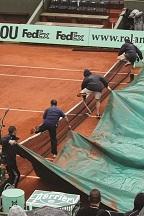

Those of us who have spent years in the sports and events industry have been involved with a wide array of events, including professional baseball, college conference championships, assorted banquets, festivals and press conferences. Every type of event has its own risks. Regardless of the event or the crisis, the most important thing is to keep your head, don’t panic, and think the problem through.
War Stories
If you’ve spent some in the sports and events business, you’ve probably got some war stories, and the scars to go with them. There was the time when as the tournament director of a college lacrosse championship, massive rains rendered our natural grass lacrosse field unplayable for the championship game. We talked through our options, worked our networks and obtained some emergency financial aid from out local CVB. With that support, we managed to book the artificial turf field at a nearby college and got our championship played on schedule.
Over the course of 14 years spent working in baseball, weather was the constant nemesis. On some occasions, we put the field tarp on and off so many times we lost count. We salvaged a playoff game by sending the interns to the grocery store to buy 300 pounds of kitty litter after we ran out of field-drying compound. We waited out a three-hour rain delay and finished a game at 2 a.m. with no one in the park but the staff, players and the umps. What perhaps our proudest moment came on a day when we never even played an inning.
It was July 4th, a make-or-break day for many teams in the low minors. A good crowd and one big bank deposit can mean the difference between making a profit and losing money for the year. This particular day, we had typical North Carolina summer weather: 100 degrees, and a 20 percent chance of rain. So, of course, it rained. And rained and rained and rained. We had thunderstorms throughout the day, with the neighborhood around ballpark getting heavy rain while much of the area didn’t see a drop. We had gotten the infield tarp down in time before each of the thunderstorms, but by 5 p.m., when the gates were due to open, we had standing water throughout the outfield and warning track. There was virtually no chance of playing a game that day.
But we already had fans lining up at the gates, the teams were in the dugouts, the flags were flying and the sun was bright. We did what any self-respecting disciple of legendary baseball promoter Bill Veeck would do: we opened the gates, sold tickets, beer, and hot dogs and threw the biggest party in town. By game time, we had almost 3,000 people in the park. We announced that we were in a rain delay due to wet field conditions, and started with our lucky number giveaways, and we took our time about it. Then we did our between inning contests, and we did some of them twice. There was a local charity doing a presentation, and we stretched that to fifteen minutes. In between, we played music, announced concessions and merchandise specials, had the PA man lead sing-alongs, and watched people eat, drink and be merry. We also called in some favors; both teams hung around without much grumbling, and the umpires cooperated in our little production. They could have easily declared the field hopeless and sent everyone home at game time, but instead, they agreed to periodically parade around the field to give the appearance that we might play later in the evening. Our grounds crew also cooperated, pushing water, working the mound and lining the field.
After about three hours of rain delay, it was finally getting dark. We made the announcement; there would be no game that night, but we were ready to shoot our fireworks. In the end, the fans that stuck around had enjoyed a night of fun and games and cold beer at the old ballpark, and they had been cordially invited to join us for the make-up doubleheader the next day. Most importantly, we had managed to put our biggest deposit of the year in the bank, salvaging our season financially, despite not throwing a single pitch.
Lesson learned? Don’t panic. Don’t appear worried. Create an optimistic mood and other people will follow your lead.

There are also times when a single event will have a lasting effect, not just on the bottom line, but on the reputation of an entire organization, and possibly on the sport. Those are times when you want to keep people coming back, not send them away with a bad taste in their mouth. How you respond to adversity can make the difference here.
Case in point: A summer college baseball league was starting a new team in a promising market. There was a long history of minor league baseball in this community, and a great old ballpark. There had been an enormous amount of time and effort spent getting a facility lease, recruiting local ownership, getting a management team in place, and after a long off-season of work and a final frenzy of activity, it was time for opening day. This was an event that would introduce the relatively unknown league to the baseball fans in the area, and much of the league staff was on hand to help kick off the season with a bang. Literally: there was a big post-game fireworks show scheduled that was supposed to end our big day with a flourish.
At this point, you may be expecting to hear a story about more monsoon rains, but it was stranger than that. It was a beautiful, warm summer day, without a cloud in sight, and people showed up in droves. A crowd of about 4,000 people packed the old stadium. The people who had happened upon the free tickets had brought along their friends, neighbors and co-workers, so despite the abundance of freebies, ticket sales were still fantastic. (Yes, we’ll tackle the debate over freebies in a subsequent article, don’t worry.) The cash registers were ringing and the staff and ownership were all smiles. There was the normal ballpark opening mishaps, which included several electric circuits shorting out, and struggling to keep up with the volume of customers at the outdated concessions stands, but the game was underway, and we were rolling. There was nothing that could put a damper on this night. That is, until the fire marshal come to talk with us.
“You can’t shoot the fireworks,” he stated emphatically.
“What do you mean we can’t shoot the fireworks?” we asked, incredulous. We had applied for our permits, paid our fee, the fire trucks were standing by, and we should have been good to go. But, we learned, if you are shooting a fireworks show, there needs to be a sizable debris fallout zone around the launch area. In many ballparks, the pyrotechnics are set up behind the outfield wall, and a section of parking has to be closed off as part of the fallout zone. We measured and marked off the correct buffer areas, but when the parking lots began filling up, people just drove through the police tape that cordoned off those sections of the parking lot.
What now? Does someone have to get on the PA and call out license plates for approximately 150 cars and ask their owners to move them? Where do you tell them to go, since the lots and neighboring streets are all jammed? It quickly became obvious that moving the cars wasn’t an option.
Could the fireworks be shot off from a different location? Nope, there was no place that would give us the fallout zone we needed to have. At this point, it became apparent there would be no fireworks that night.
The new owner moved into full panic mode: “This will ruin us, but we’ll have to give everyone their money back! We need to get the ticket windows open and get ready to do refunds!”
We pointed out the tickets said ‘No refunds.’ He was adamant that attendees would be furious. We assured him they would not. This just needed to be handled the right way.
And here is the secret: Everyone has heard the message that communication is key; however, as it turns out, knowing what, when and how to communicate is often the most important part. When we reached the seventh inning, people were having a great time, but close to half the crowd had already gone home. Disappointing 2,000 people was a much better prospect than disappointing 4,000 people. As the seventh inning stretch got underway, the big announcement was made:
“Fans, we are so glad you are here with us, and we look forward to many more great nights of baseball here. We are very sorry to announce that due to some technical problems, we cannot shoot our post-game fireworks tonight, and we apologize for that.”
The crowd did not boo, but rather uttered a collective sigh of disappointment. The announcement continued: “But, to make it up to all of you, we will be giving each of you two tickets that you can use for ANY other game this year, including the night the fireworks show is re-scheduled.” The crowd actually cheered. Crisis averted and faith restored.
Staff members were stationed at each exit with a giant stack of undated general admission tickets, and as fans left, they were each handed two tickets. Most had a big smile on their face and expressed their thanks. Instead of feeling disappointed over the lack of fireworks, they were happy at the prospect of attending two more games for free.
Of course, it would have been nice to shoot the fireworks, but in the end, the fans received a goodwill gesture with great appreciation, and many of those tickets showed up again within the next week or two, including quite a few the night we re-scheduled the fireworks. Yes, thousands of free tickets had been given away, but a good relationship with the fans was intact. (Oh, and when those fans came back to the ball park, they bought hot dogs, drinks and T-shirts and saw all the signs and promotions by the team’s advertisers. Not only was it a feel-good victory, it had positive economic impact).

When things get rough (and they will), don’t throw in the towel. Here is a list of things to do:
Think things through
- Put yourself in your customers’ shoes.
- Find a solution that would satisfy you if you were in their position.
- Be creative; think of options that may seem beyond possibility
- Communicate in the most positive way possible
- Talk to people you know who might be able to help, and if there’s no good solution to the immediate problem, think about re-framing the problem. (No fireworks? No problem, let’s do something else that will make our fans feel good about their experience. No ballgame? No problem, let’s throw a party).
And, finally, if there is truly no good solution, do the best you can, apologize profusely (even if it’s not your fault), take you licks and live to fight another day.

